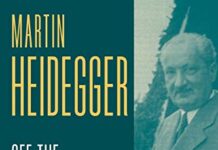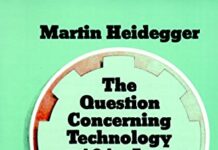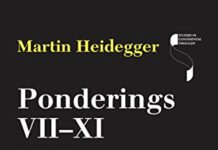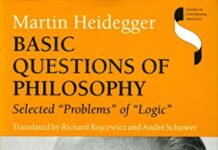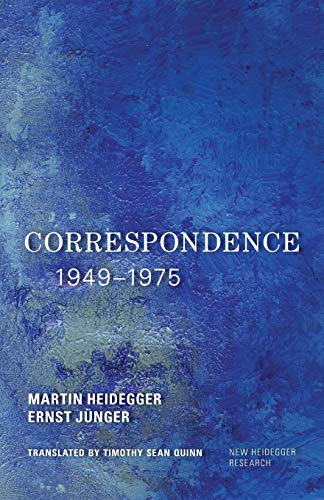
Ebook Info
- Published: 2016
- Number of pages: 144 pages
- Format: EPUB
- File Size: 2.30 MB
- Authors: Martin Heidegger
Description
Beginning in 1949, the German novelist and essayist Ernst Jünger began a correspondence with the philosopher Martin Heidegger that lasted until Heidegger’s death in 1975. This volume contains the first English translation of their complete correspondence, as well as letters from Heidegger’s wife and son and others referred to in their correspondence. It also contains a translation of Jünger’s essay Across the Line (Über die Linie), his contribution to a Festschrift celebrating Heidegger’s sixtieth birthday. Jünger’s and Heidegger’s correspondence is of enormous historical interest, revealing how both men came to understand their cultural roles in post-war Europe. It is valuable as well for showing the emergence of themes pervasive in Heidegger’s post-war thought: his cultural and political pessimism and his concern with the problem of global technology. The correspondence also reveals the evolution of a philosophical friendship between two writers central to twentieth century European thought, and the mutual influence that friendship worked on their writing.
User’s Reviews
Editorial Reviews: Review Correspondence 1949-1975: Martin Heidegger and Ernst Jünger (2016) presents an intimate portrait of two influential German philosophers. The letters provide significant insight into Heidegger and Jünger’s philosophical minds, as well as the eras from post-WWII to the Cold War. The letters are an important collection, and while the correspondence can be found elsewhere, this version benefits from a fluid and intelligible translation. In addition, translator Timothy Sean Quinn, Philosophy Department Chair at Xavier University, has included Jünger’s essay “Über de Linie” or “Across the Line” at the end of the correspondence. This inclusion fits well, as mention of the essay appears in the early letters, written as a gift for Heidegger on his 60th birthday. “Across the Line” functions as bookends to the letters and provides the reader with a perspective of time, place, and philosophical theory that, perhaps, the letters alone could not perform…. Quinn’s publication comes at an interesting time in the world, a time that reflects the era in which Jünger and Heidegger were composing. Quinn’s translation reads smoothly, is intellectually stimulating, and poetically intriguing. Without a doubt this collection is a valuable addition to the canon of research for both Heidegger and Jünger. ― Phenomenological ReviewsWhile each is a neglected figure in American academia, the correspondence of these two impressive thinkers makes for an impressive addition to understanding their oeuvres. There is a tendency to think of philosophers and writers as devoid of personal lives, and hopefully this volumewill contribute to rectifying that error. ― Mountain StatesmanWith this elegant translation, Timothy Sean Quinn allows us to eavesdrop on a fascinating conversation: two prolific authors, moved by Nietzsche to confront nihilism, discuss their writings and share life’s moments – Heidegger consoles Jünger for the loss of his spouse, and the final letter, sent by Heidegger’s wife, is a collection of poems that had comforted him on his deathbed. The humanity of the thinker strikingly emerges in these beautifully rendered exchanges. — Chad Engelland, Assistant Professor of Philosophy, University of Dallas About the Author Martin Heidegger (1889-1976) was a German philosopher and one of the most important European thinkers of the twentieth century.Ernst Jünger (1895-1998) was a celebrated German novelist, essayist and philosopher.Timothy Quinn is Professor of Philosophy at Xavier University. Excerpt. © Reprinted by permission. All rights reserved. Correspondence 1949–1975By Martin Heidegger, Ernst Jünger, Timothy Sean QuinnRowman & Littlefield International, Ltd.Copyright © 2008 Martin HeideggerAll rights reserved.ISBN: 978-1-78348-876-6ContentsAcknowledgements, ix, Translator’s Introduction, xi, Part I: The Correspondence Between Ernst Jünger and Martin Heidegger, 1, Part II: Ernst Jünger’s Essay, Across the Line, 67, CHAPTER 1Part OneTHE CORRESPONDENCE BETWEEN ERNST JÜNGER AND MARTIN HEIDEGGERCorrespondence Between Ernst Jünger and Martin Heidegger1) Ernst Jünger to Martin Heidegger, (14b) Ravensburg, Wilhelm-Hauff-Strasse 18, 11 June 1949Dear Herr Professor,Herr Klett and Dr. Nebel have informed me about their correspondence with you. Although I welcome the plan for a journal and for the editorial committee they have in view, I also understand your reservations, thanks to similarities to my own situation. The fact of a collaboration, or even working in common, seems unobjectionable to me; on the other hand, I regard granting an official status to this common work, either on the title page, or through an advertisement, as a step worth being weighed for a long time, and perhaps reserved for a later stage. I responded in this way to Herr Klett, and have included a copy of my response for you. I think my brother shares this opinion. We all find ourselves in a situation where it is fitting to offer to the polemic only material that is absolutely necessary. In any case, things must be considered carefully, since much depends on them. It is necessary to give preference to points of view that favor the work of the collaborator.I hope that you are enjoying this lovely season from your high locale. For my part, I am content with having moved to Ravensburg, where I can work well. In addition, leaving the English zone for the French, one has the feeling of entering into the sphere of a cultivated nation, in spite of all the cosmetic deficiencies that are inevitably tied up with an occupation.With best wishesYours, E. J.[the following letter was included by Ernst Jünger] Ernst Jünger (14b) Ravensburg, Wilhelm-Hauff-Strasse 18, 11 June 1949Dear Herr Klett,I gratefully received your kind letter of 7 June. I am therefore ready for our trip into streams of Mexican colors, and I ask you to proceed with all necessary preparations with Dr. Frederking. Naturally, it will be necessary to avoid turning the thing into a folk festival. The great room of Pastor Gestrich seems to me entirely suitable for the experience.I am grateful for the paper; the most practical format for me would be that of the sheet on which I now write.Dr. Nebel kept me posted about your correspondence with Professor Heidegger. My brother Friedrich Georg, who actually stayed in Hirschberg at the Countess Podewils’s, has yet to give me a definitive answer. The reservations Professor Heidegger expresses are not unfounded; they tally in part with mine, which I’ve explained to you and to Dr. Nebel. Heidegger and I have found ourselves for the past four years at the center of an intense polemic, and have indeed survived it; but it is important that we in no way offer a larger target to our adversaries. I believe that Professor Heidegger has as little to fear from a substantial statement as do I, but that he must dispel any suspicion of political action. The publication of a journal would however be considered in a political light, whether we intend it or not — here as well as abroad. I would still prefer then, that Dr. Nebel assume sole editorial responsibility and that we however assist by collaborating with him, which would also please my brother. The effect remains the same, but this reduces the possibilities for attack. If each of the principal collaborators declared themselves prepared to give a contribution to the first number, the launch would be assured, and the journal would receive a definite look. There would always be time to institute a closer collaboration once the necessary authority had been assured of the quality of the magazine and its audience. Indeed, I assume a stream of new and even as yet unknown collaborators. This is the position in which I find myself, and which requires that the right thing be a calm and precise action. I suggest then that you initially approach the other gentlemen from the point of view of a permanent collaboration, based solely on regular participation. For my part, I am entirely prepared. Hopefully, the common work will drive further efforts.So much in brief. I do hope to see you next month. Concerning Herr Hiller, more time is needed. Perhaps one day you could command Nebel like a new Odysseus against this Thersites. I hold Hiller as one of those principally responsible for the Jewish pogroms; it was he who furnished material for the Stürmer by besmirching everything German for decades. Hiller and Streicher, they are two sides of the same coin, and I hold it superfluous for you to answer such men with arguments.With best wishes,Yours, E. J.2) Martin Heidegger to Ernst Jünger, Freiburg-in-Breslau, 23 June 1949Dear Herr Jünger,I thank you for your letter that aligns with my own reflections. But first I must ask that you drop the “Professor.”I still recall well the location of the path on which we spoke last autumn about the extreme danger that faces those who try today to hold onto what is essential; that to endure solitude is not an escape, but the highest freedom.Yet the natural urge to bring help immediately, to offer support and guidance, moves us to attempt things that turn out to be wrong after more rigorous reflection.Since Herr Klett and Dr. Nebel came to see me, not a day passes when I do not reflect on the project. The will to discover and to make visible in an original way what is authentic in the western tradition, to gather together those who wait, to strengthen those who seek, is enchanting. But, as I see clearly today, all this goes down the path of a relapse into the worn-out form of the journal. The tyranny of public opinion cannot be broken within it. The joint appearance of our names, even under the simple form of a regular collaboration, would be transformed into a political event that would perhaps either shake our last secure position, or in the end confuse it.There is a posthumous note of Nietzsche’s with which you’re certainly acquainted, from the time of the Gay Science: “Venice is formed by a hundred profound solitudes together — that is her magic. An image of the man of the future.”It seems to me that a law for future poets and thinkers hides here, for whose preparatory practice we are perhaps appointed.That is why I think we should retreat from this project and allow its fate to mature longer. We should not throw the last scraps to the persistent thirst for vengeance, which has in the meantime become more crafty; we must remain unassailable in what is proper for us. The best tactic would not at all help; we have been overtaken tactically for a long time. A few days ago, my friend, a refugee from Upper Silesia who lives with us, received a letter from a Jewish émigré (a professor in the USA) who wrote that he (that is, is to say, “one” [d.h. man]) is extremely anxious to learn what was going on with Jünger’s and Heidegger’s new journal.I am pleased that you feel at home in Upper Swabia, a land I love, and I hope that I can visit you there one day. We leave at the end of the week for the hut, which is no longer so weatherproof.Cordially,Yours, Martin Heidegger3) Ernst Jünger to Martin Heidegger, Ravensburg, Wilhelm Hauff-Strasse 18, 25 June 1949Dear Herr Heidegger,Your judgment of the situation comes across as quite correct. The idea of constituting an organ for the last independent thinkers and creators was somewhat attractive. But it would perhaps have led to a stronger investment than was the intention of the participants. In the course of the last year it became entirely clear to me that silence is the strongest weapon, providing that something hides itself behind it that is worth being hushed up.I will happily come up when I have the chance, perhaps in the company of Friedrich Georg or Vittorio Klostermann. At the moment, I am submerged in work on old and new manuscripts.Cordially,Yours, Ernst Jünger4) Ernst Jünger to Martin Heidegger, Ravensburg, 6 January 1950Dear Herr Heidegger,Once again I have to thank you for the gift of your “The Country Path.” This gift has offered me new insights into the nature of your thinking.As our common editor Vittorio Klostermann has reported to you, I wish to express to you my thanks, not only for your gift, but for your existence, by means of a contribution to the Festschrift that will appear on the occasion of your jubilee. The contribution would perhaps not be homogeneous with the others, but on the other hand, hopefully, genuine.From Herr Barth, one of my readers, I received a detailed account of your visit to Bremen. I don’t know whether the discussion he reported is sufficient in its details. It struck me that you have spoken of “my” new theology — in any event, it is an ambition to which I do not aspire. What unsettles me much more is the absence of any profound theological analysis, which I hope philosophers will put right; this is a task that neither the philosopher nor the poet could evade, not to mention entirely independent of other forces.Further, concerning myself, I do not claim to be a Christian. Even less, an anti-Christian. In this respect, there seems to reside a significant antagonism in your statements. I would rather prefer to remain favorable and wait and see, appreciating the facts. The churches have absorbed many of the shocks we have experienced. Even today, in a town like Ravensburg, were the two confessions there to disappear, cannibalism would break out overnight. It sits beneath a thin veneer.I grant that these are still things one can appreciate post festum. But who knows whether in some inaccessible supernatural world, there is not already, among others, a Christian age seeking to be born? Perhaps the preliminary events that are coming to pass there will become manifest even in our lifetime. Heaven seems like an eggshell that just needs one last peck.I have abandoned the plan for a journal. I recognize how correct your hesitations were, in particular, in view of the new press campaign that is underway against me. Many people find that I menace their security. Certainly, such a forum for clarifying issues such as these would have been good, but it is better to stay away from conversation with the “lemurs.”Cordially,Yours, E. J.5) Martin Heidegger to Ernst Jünger, Freiburg im Breisgau, 18 December 1950Dear Herr Jünger,My heartfelt thanks, arriving scandalously late, for your “contribution.” “Across the Line” is a stimulating venture in which you take part immediately in Being itself. Your contribution, like your brother’s, is in this way essentially distinguished from all the other contributions. At the same time it expresses an encouraging affinity for walking “off the beaten track” that you illuminate clearly.The spirit that was already active in The Worker, but which, in a certain way, still remained tied there to a fixed reality, is now purified, its vision widened, and, above all, has gained in prescience and, ready to assist, is freely on the way.This writing brings to young people a beautiful initiation in a seeing that is not limited to an analysis of the situation, and then coupled with instructions for how to act. The seeing is itself a crossing of the line.But above all, this presumed demand also restores a desperate courage to those who still manage “the unknown capital of suffering” (258, 274). They are often reduced to clumsy attempts, within an environment that would still like to be furnished in long-fragmented modes of representation.As I read your “contribution” for the first time — I read it first, before the others — I was, aside from the well-traversed path, especially pleased, since I could say to myself that you yourself have already attained freedom and superiority in relation to The Worker, which allows you to bring that work once again to the consciousness of the age. You know from our first conversation on the way to Stübenwasen, how much this work means to me. Yet perhaps “Across the Line” is the germ of a newer version, in style and dimension, of The Worker.That is why I would still like to indicate my particular interest in your “contribution” by means of some questions.I find the metaphysical kernel on the bottom of page 271: “The moment in which the line is passed brings a new turning approach (Zuwendung) of Being….” Must we not, in order to respond to the essence of Being, at the same time say: the line is first passable in the moment instigated by Being in its turning approach, which turning approach is first an awakening and eventful addressing of the essence of man?The crossing of the line that unfolds in proximity to nothingness is no mere advance of man. It is at the same time an over taking by what saves, whose beyond first genuinely illuminates the line for the crossing over. It seems necessary to me to keep this in view in order to acquire the purity of your style for this path.In that direction two questions preoccupy me. They lead to articulating the extremely important distinctions between nihilism as a “fundamental power” and chaos, illness, and evil. Without clarifying these relations, “theology” in particular gropes about in the fog.If however the fundamental power of nihilism and therewith “the line” are not symptoms of an illness, then the thinking that goes beyond the line still remains inadequate to its object, as long as it is grouped under medical terms of prognosis, diagnosis, and therapy. Clearly, it could be that you have chosen this classification simply because the inevitable limitations of your contribution demand it. I know that you are far from elevating psychotherapy to the metaphysics of the age. Because, nevertheless, the modes of representation converge there and thus promote a new and dangerous anthropology, it would be necessary to stem the tide. To be sure, there is a plan of the young Nietzsche from the year 1873, for a text whose title would be: “The philosopher as the physician of culture.”My second question concerns the notion of “order.” You show clearly that even in nihilism order reigns (253), that it even belongs to its style (256). On the other hand, you state (250) that on this side of the line is found no “supreme thought of order,” any more than “the perfect work of art.” Even beyond the line you retain order as a fundamental category, and you distinguish only by degrees between order on this side of the line and across the line. It seems to me that the line would be the boundary for an essential distinction, not finite but infinite. The category of order is still a relic of the ungrounded form-matter relation, in any event, in which all dialectic moves, whether idealistic or materialistic, systematic or historical. Not that a supreme order does not have to reign beyond the line. But “order” does not constitute the original; it remains something founded, just like values. By contrast, your statement at the top of page 272 seems essential to me: “On this side of the line however one is incapable of judging things.”Yet do you not overestimate the contemporary position of the natural sciences in respect of “crossing the line?” Not only are they at a dead end, they are incapable of seeing the dead end by their own means. That traditional philosophy now has nothing to offer, is entirely accurate. But I believe that there is a kind of thinking that is in a position to show what is really taking place when uncertainty has forced itself on physicists.Since I know how much you appreciate the artisanal work of the author, I allow myself to indicate a triviality.In the penultimate paragraph of page 252 you establish a correspondence between “intuition (Anschauung) and cognition (Erkenntnis)” and “image and concept.” Because from time immemorial, intuition has been considered to be cognition, yet at this place you want to indicate the non-intuitive, conceptual “conceiving” (Be-greifende) in contrast with intuition, you should therefore have “judgment” (Urteil) there instead of cognition.But I should merely thank you for the lovely gift, instead of indicating oversights.Perhaps one day there will be an opportunity for conversation, in which we can go through questions concerning content and style. The two cannot be separated. The question of style is at the same time a mystery of the atelier and of vocation. It does not tolerate public exposition. But it remains for us most necessary and most crucial. Style belongs to the content itself.Around All-Saints’ Day, I was in Messkirch for a few days with my brother and came close to descending upon you in your new house. But time and the opportunities for transportation were then too unfavorable.Meanwhile, in the midst of the confusion and darkening of the world and exposed to the superpower of a public opinion that distorts and falsifies everything, it seems to me the only thing that remains possible and even adequate is to speak without being heard, simply to respond to the turning of Being in the moments granted. Presumably, it is first necessary to let men know that in such response the voyage into “the immeasurable” begins. (Continues…)Excerpted from Correspondence 1949–1975 by Martin Heidegger, Ernst Jünger, Timothy Sean Quinn. Copyright © 2008 Martin Heidegger. Excerpted by permission of Rowman & Littlefield International, Ltd.. All rights reserved. No part of this excerpt may be reproduced or reprinted without permission in writing from the publisher.Excerpts are provided by Dial-A-Book Inc. solely for the personal use of visitors to this web site. Read more
Reviews from Amazon users which were colected at the time this book was published on the website:
⭐Among the greatest writers in postwar German literature were Ernst Jünger and Martin Heidegger. The former, whom I have written about previously, was a veteran of the First World War and novelist who described the experiences of combat as a clarifying force. Heidegger, on the other hand, was an existential philosopher whose book Being and Time loomed large over Continental academic departments for most of the second half of the twentieth century. Gravitating towards similar social circles, they met for the first time in 1948 and began to exchange letters the following year. The complete Correspondence, 1949-1975 has now been printed in English for the first time by the British publisher Rowman & Littlefield International.The prompt to initiate their correspondence was a close associate of Jünger’s had proposed the two contribute to a new journal on philosophy. Heidegger, however, remained ambivalent and replied, “The joint appearance of our names, even under the simple form of a regular collaboration, would be transformed into a political event that would perhaps either shake our last secure position, or in the end confuse it.” This alludes to the criticism both had received after World War Two as enablers of fascism. While defenders of Jünger could truthfully state he was a conservative nationalist who refused to join the Nazi Party, Heidegger was well known for his enthusiastic membership and had been banned by the Allied occupation authorities from teaching. As such, the idea proved impractical and the publishing venture ultimately died. The correspondence continued, however, until Heidegger’s death in 1975.The subsequent letters range from those of substantial depth to the fleeting salutation or invitation to tea. Occasionally, they reveal the pressures each operated under, such as Heidegger’s paranoid comment about a former Jewish colleague interested in the aforementioned journal, or Jünger’s commenting on the merits of French occupation versus British oversight. Relatively few of the letters display philosophic insights into the worldview of each that cannot be found elsewhere, although Heidegger does comment on an interesting maxim by Antoine Rivarol. The subject most recurrent is their mutual interest in the effect of technology on modern society. Interestingly, this was a subject covered in greater depth by Friedrich Georg Jünger, Ernst’s brother, but with the exception of a few brief missives, his voice is absent from this collection. Despite respecting one another, it is surprising how formal the letters remain over the span of a quarter-century. There are only fleeting allusions to family, and the letters are almost entirely devoid of humor. The one grimly amusing moment was when Jünger’s wife dies in 1960 and Heidegger writes a letter of consolation. The next letter less than two years later has Heidegger addressing Jünger and his new wife.What is also notable regarding this correspondence is how one-sided it is. Each was widely respected by their readership, but most of the initiative to exchange views was performed by Jünger. This might be in part because Heidegger was an intimidating thinker and Jünger desired his respect, but I cannot help but suspect Heidegger regarded him as only a polite acquaintance. Following Heidegger’s death, included are his son’s letters wishing Jünger a happy birthday and a request for copies of their correspondence for publication. The last (and best) portion of this slim volume is an essay by Jünger titled “Over the Line” that was originally part of a Festschrift in honor of Heidegger. In it, Jünger seeks to explain the effect of Friedrich Nietzsche and nihilism as reflected in modern technology, concluding the worst of Europe’s days were over. In a letter responding to “Over the Line,” Heidegger remained ambiguous about humanity’s ability to control and give meaning to its environment.While each is a neglected figure in American academia, the correspondence of these two impressive thinkers makes for an important addition to understanding their oeuvres. There is a tendency to think of philosophers and writers as devoid of personal lives, and hopefully this volume will contribute to rectifying that error. Although their records will remain controversial, I am glad Heidegger and Jünger still have a voice in the twenty-first century.
⭐Not found.
⭐Not found.
⭐Not found.
⭐Not found.
⭐Not found.
Keywords
Free Download Correspondence 1949-1975 (New Heidegger Research) in EPUB format
Correspondence 1949-1975 (New Heidegger Research) EPUB Free Download
Download Correspondence 1949-1975 (New Heidegger Research) 2016 EPUB Free
Correspondence 1949-1975 (New Heidegger Research) 2016 EPUB Free Download
Download Correspondence 1949-1975 (New Heidegger Research) EPUB
Free Download Ebook Correspondence 1949-1975 (New Heidegger Research)
